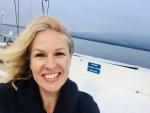
10 tips for doing business with European tourism buyers
The key to winning and retaining business from Europe is building successful relationships with tourism buyers. The market for European tourism buyers is crowded and competitive. It comprises tour operators, online travel agencies (OTAs) and travel agents. It is a mature market, populated by very experienced operators. To work well with these professionals, it is important to understand how to do business with them.
Contents of this page
- Understand the business culture of your buyers
- Communicate in a clear and precise manner with European tour operators
- Honesty and clarity are paramount
- Create a unique selling point for your product
- Consider teaming up with other local operators or DMCs
- Market your trips and experiences online
- Set a fair price for your services
- Be upfront about concerns over infrastructure
- Join trade membership organisations
- Seek advice
1. Understand the business culture of your buyers
Understanding how people do business is essential to developing successful international business relationships. The ‘business culture’ of every country or region is different. Business culture includes the culture, behavioural norms, ethics and etiquette of a country. It also refers to an organisation’s values, beliefs and working methods. Europe is a diverse continent, but countries grouped in geographical regions share certain similarities when it comes to how they conduct business.
- Northern Europe: People in Denmark, Finland, Iceland and Sweden have a good level of English. People in Ireland and the United Kingdom are native English speakers. Businesspeople in these countries appreciate getting facts and technical details. Punctuality is regarded as a sign of reliability and professionalism. It is appropriate to use titles (Mr, Mrs, Ms) until the client switches to using first names.
- Southern Europe: In Croatia, Cyprus, Macedonia, Greece, Italy, Malta, Portugal, Slovenia, Spain and Turkey, it is important to develop personal relationships when doing business. Contacting the right people and maintaining strong bonds with business partners is essential. Trustworthiness, loyalty and respect are key elements for doing business with partners in these countries.
- Western Europe: Businesspeople in Austria, Belgium, France, Germany, Luxembourg and the Netherlands like formal business practices. They prefer documentation and formalities over personal business relationships. Punctuality is also an important attribute for this group. English is also widely spoken in these countries. In the case of French businesspeople, if you can speak French to them, it may be very positive.
- Eastern Europe: The groups of countries comprising Bulgaria, Czech Republic, Hungary, Estonia, Latvia, Lithuania, Poland, Romania and Slovakia is too large and diverse for generalisations. If you plan to do business with partners in any of these countries, do more research into the specific country, its language and business culture.
You can find out more about business culture and etiquette, developing international business relationships and individual European markets at Passport to Trade 2.0. There are some useful Country Guides that offer advice on a country’s culture, etiquette, customs and how to conduct business meetings. All the major European markets are included: Germany, the United Kingdom, the Netherlands and France. Have a look at the Scandinavian markets too, like Sweden and Denmark, and the Eastern European market.
You can also consult travel guides for the countries you are targeting, which may have a section covering common cultural behaviour. These could include conventional greetings, how to address people, meaning and importance of gestures, negotiating styles and customs around giving and receiving gifts.
Tips:
- Be aware of cultural differences between your country and your target country. Try to adapt your usual business practices to match theirs.
- Addressing someone by their name is considered respectful in general and may improve goodwill and communication. Never forget to say ‘thank you’ in your dealings with European buyers.
- Try to learn and use a few words in your buyer’s native language. They will appreciate the effort.
- It takes a long time to build trust in a business relationship. Being honest and keeping promises are vital.
- In meetings, always listen to your potential buyer. Unless there is an emergency, it is considered bad manners to use a mobile device in a meeting for an unrelated matter.
2. Communicate in a clear and precise manner with European tour operators
European tour operators are skilled businesspeople who like clear, precise communication. They like to have immediate, quick answers to their queries and problems. Always replying promptly sends a message of reliability and professionalism. Ensure that the information you provide is factual and accurate.
Face-to-face is often the best way to communicate in business, as personal contact helps to develop relationships faster. One-to-one meetings can be held in business offices, on location or at trade fairs.
Today, virtual online meetings using platforms such as Microsoft Teams, Zoom, Google Hangouts or Skype have become the norm for face-to-face meetings. It is also much cheaper to meet online in this way, particularly when you are meeting for the first time. In time, you could also invite potential buyers to visit your country so you can show them around and give them a taste of what you can offer while getting to know them better.
When scheduling online meetings, it is a good idea to confirm a meeting by email. Be sure to begin the meeting on time and remember that there may be differences in time zone, office hours and public holidays. In some countries, such as the UK, many offices are open seven days a week.
In 2022 and 2023 many business to business (B2B) travel trade fairs will be live events again, such as WTM London and ITB Berlin.
Tips:
- Consider planning a trip to Europe to visit a major trade fair. Have a look at WTM London’s top tips when visiting WTM for the first time to help you make the most of your trip. Consult the exhibitor directories and make a list of potential buyers you would like to talk to.
- Plan a schedule of meetings with tour operators and set up them up well in advance. Ensure to follow up promptly after every meeting, even if it is just to say, ‘Thank you for your time. It was good to meet you’. If they don’t have time to meet you at the fair, suggest meeting at their offices. You could arrange to meet several operators on one trip to make the most of your time.
- Make sure that the technology you have in your office is as up to date as possible so you can stay in regular contact with buyers. Find an IT expert to help you with your systems if you need to.
- Pledge to return calls and respond to email queries within a maximum of 24 hours, even if it’s just to say, ‘we will get back to you when we have an answer to your query’. Ensure you stick to whatever you commit to and keep in regular touch.
- Ensure that your phone is answered by someone who can speak English reasonably well and is a confident communicator over the phone.
3. Honesty and clarity are paramount
Creating positive, sustainable and responsible travel experiences for European tourists is a high priority for European tour operators. Building relationships with suppliers is a crucial part of their business. They work with many suppliers to make this happen, often all over the world. Working with suppliers who are honest, reliable, and clear is essential, since it takes time to develop a strong bond with a new supplier. As a local tour operator, building trust from the start will pay off in the long term.
You should also be open to visits and inspections by suppliers, who may want to see evidence of your systems and insurance policies.
Tips:
- It is important that you can show you know your destination well and demonstrate you have strong connections with local service providers. These include suppliers of accommodation, food, transport and tours.
- Be honest about what you can and cannot provide since creating false expectations harms trust. Apply this across all your working practices: capacity, product quality, pricing, staff experience, etc.
- Don’t exaggerate your capacity, including how many visitors you can manage effectively or whether you have enough accommodation capacity for a large tour group. If you manage growth well, you can be open with your buyers about plans for upscaling your business to meet future needs.
- Be upfront about issues that might affect tourism in your country or region, such as security issues. European tour operators are constantly monitoring safety and security issues on behalf of their clients. They are likely aware of any problems in your destination and expect you to be well informed about them. Again, being honest about everything, including possible risks and any negative developments reaffirms trust.
- Consult travel advisories from the governments or departments of foreign affairs from your buyers’ countries. For example, in the UK, the Foreign and Commonwealth Office issues travel advice to help British nationals make decisions about travelling abroad. The French Ministry for Europe and Foreign Affairs offers a similar service, Conseils aux Voyageurs, which is available in French only.
4. Create a unique selling point for your product
Travel to developing countries is often regarded as adventurous. But the market is crowded and competitive and European tour operators are always looking for ways to differentiate their itineraries from others on the market. Creating a unique selling point (USP) for your adventure product will help it stand out from other similar trips and experiences on the market. Read the CBI report on how to determine your unique value proposition for additional information.
To help identify your USP you should conduct an analysis to identify your Strengths, Weaknesses, Opportunities and Threats, known as a SWOT analysis.
Figure 1: SWOT Analysis Diagram
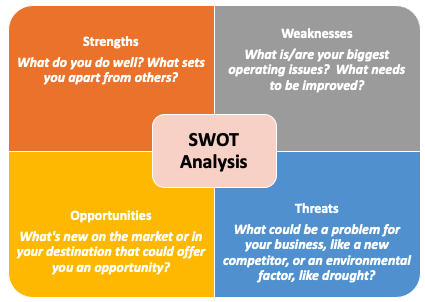
Source: Acorn Tourism Consulting
SWOT Analysis is often done in a ‘brainstorming’ session. Invite your staff to take part in the brainstorming session and encourage them to be direct and to contribute their ideas. Use a flipchart and use the guide above to help you. Write everything down – there are no ‘wrong answers’, or ‘bad ideas’.
- Strengths and Weaknesses refer to internal factors within your own business.
- Opportunities and Threats refer to external factors, like your competitors, or even environmental and political factors.
Imagine that you are the customer and consider what he or she wants or needs. Make sure that you understand clearly what is special about your destination and the product you are offering. You should also analyse the USPs of your competitors so you can differentiate yourself from them.
Here are some other ideas for creating a USP to make your product stand out:
- Have trained and knowledgeable guides with qualifications, good reviews and recommendations.
- Cater to several different languages to broaden your market.
- Visit different places from those offered by competing suppliers.
- Offer a combination of experiences to add value.
- Include community engagement to enhance traveller experience.
Read the article How to Supercharge your Travel Brand with a Killer Value Proposition to see how the big travel brands target their customers successfully through USPs.
Tips:
- Stay up to date on emerging trends that could provide opportunities for you to develop your USP. Read the CBI report on Trends, opportunities and risks in the European outbound tourism market. This report is updated every year.
- Ensure your trips and experiences are created under sustainable and responsible principles. Make sure that your customers are aware of this too, as sustainability is important to many European travellers.
- Clearly state what’s special, different or unique about your products and ensure that you tell your buyer.
- Once you have created your USP, make it part of your strapline, also known as a tagline, and include it prominently on your website and promotional material.
5. Consider teaming up with other local operators or DMCs
Many European tour operators like to do business with destination management companies (DMCs), which work with many local operators to diversify business practices and make them more efficient. DMCs usually work with local operators that specialise in different niches, such as bird watching tours, cultural tours, adventure excursions and hiking trips. By working with DMCs, European tour operators can pick and choose which tours to add to their itineraries.
If there are no DMCs in your country or region, consider joining other local operators to create a coordinated marketing effort to promote to European tour operators. Presenting yourselves as a collective organisation with similar or complementary products may be more attractive to European tour operators.
Working with a DMC or collectively with other local operators could afford additional benefits, such as enhancing your reputation. It could also help make cost savings in shared marketing costs to attend a trade fair.
Tips:
- Contact DMCs operating in your country or region to find out how to become one of their local operators.
- Check the trips and experiences other local tour operators in your area offer to find out how they are similar or complementary to yours.
- Contact other local operators in your country or region to find any common ground for potential joint business opportunities.
- Read the CBI’s Tips for finding buyers in the European tourism sector to identify trade shows and tourism fairs where DMCs also often exhibit.
6. Market your trips and experiences online
Your website is the face of your business for European tour operators and independent travellers. The Internet is a key business tool used by most European tourists to research their holidays. Your website should be professionally designed and offer inspirational content that appeals to potential buyers.
European tour operators are likely to do business with you under their name. This means they will purchase your services and market the trip to their customers under their brand. They will create their own marketing materials but will rely on detailed information from you to ensure all the details they publish are accurate.
It is crucial that you are responsive and meticulous when providing information. Your buyers work to tight deadlines and cannot afford to miss them. If any changes come to light, such as a change in itinerary or price alteration, you should inform them immediately. Keeping it undisclosed will only harm your relationship.
European travellers spend a lot of time researching where to go and which trips to take before deciding to book. An inspiring, well-designed website with full trip details, lots of images and videos will appeal to this type of buyer.
Set up a Google Business Profile (GBP)
Next, you need to make sure people can find your website or business. A Google Business Profile (GBP) is a good place to start and a well-managed GBP should be a key part of your marketing strategy. A GBP is particularly useful for local businesses and SMEs in local markets that do not have large advertising budgets to generate significant paid or organic traffic. The aim of a GBP is to connect internet users with local businesses.
A GBP is displayed across three formats:
- A Knowledge Panel – this shows up when a particular business has been searched for by name or has been clicked on via the Local 3-Pack. Knowledge Panels show up on the right-hand side of the first page of the search results. (See Figure 3 below for examples)
- Maps
- Local 3-Pack – after a high ranking in an organic search result, a position in the Local 3-Pack is the next most important and should be the focus of your efforts.
In the tourism sector, the Local 3-Pack works by displaying the business profiles of three local operators whenever a user searches for a local tour or activity – such as ‘trekking in Chiang Mai’ or ‘whitewater rafting Zambia’. These business profiles are displayed on the first page, following any paid or sponsored links, as shown below. These are not website links, but business profiles.
All these local tour operators are featured on the very first search page, free of charge, but only because these operators have optimised their Google Business Profile. You do not need a website, but it will help your business if you do. There are many ways of building a free or low-cost website using online website builders.
Figure 2: Google Business Profiles – Local 3-Packs
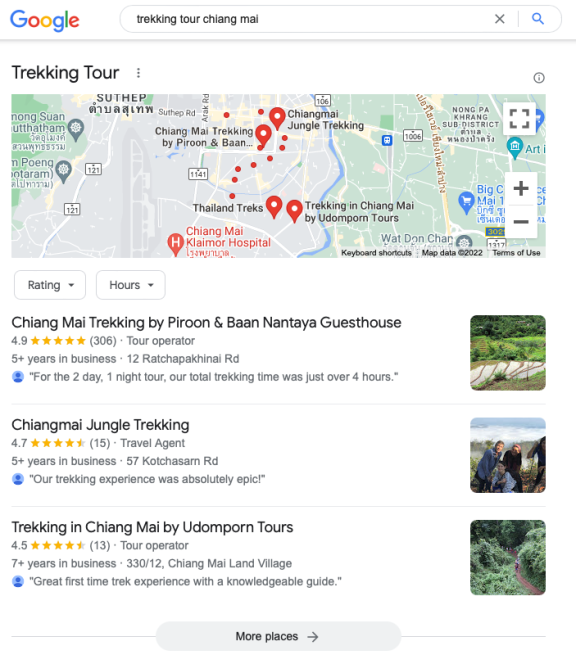
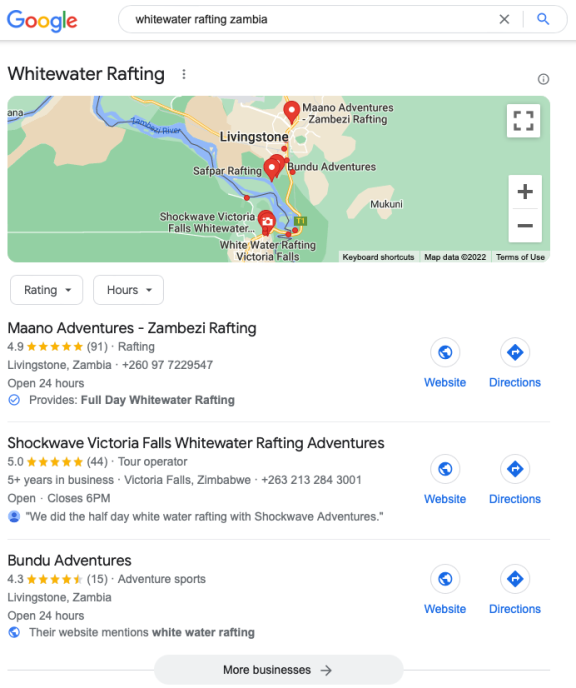
Source: Google
You start by creating your business profile, which is free. You can find out how to do this on Google Business Profile. Look at the examples of three of the local operators featured above. You can see how the operators have included all the important details as well as photos and maps, links to their websites and contact details.
Figure 3: Examples of Local Operators’ Google Business Profiles
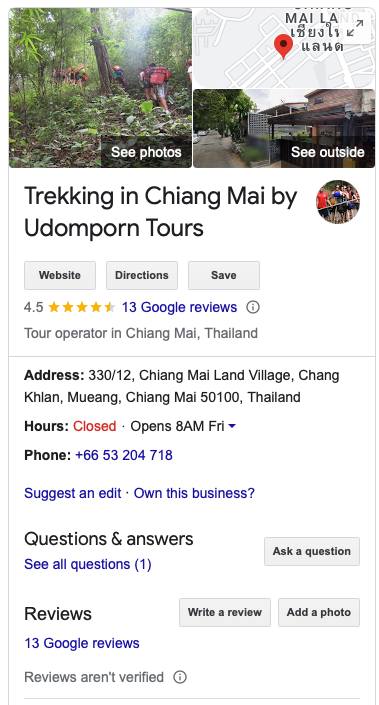
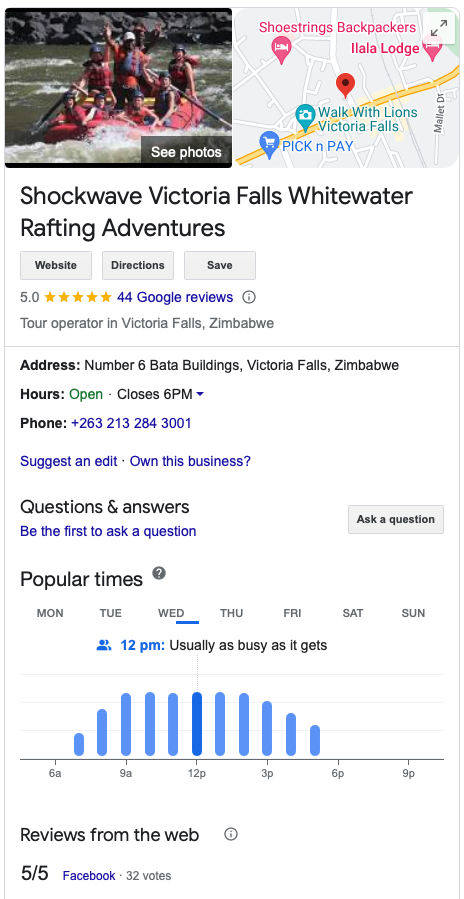
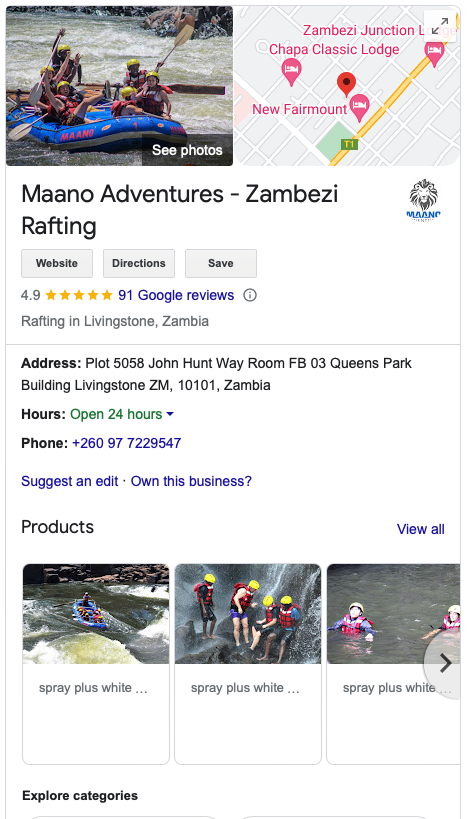
Source: Google
For more information about how GBP works, you can read the blog Mastering Google Business Profile for Tourism Operators. There are many other guides online. Be aware that Google My Business (GMB) changed its name to Google Business Profile in 2021, and older guides still refer to Google My Business, but they can be equally helpful.
Tip:
- Read the CBI study ‘How to be a successful tourism company online’ for more information about creating a website and enhancing your online presence.
7. Set a fair price for your services
If you sell both to European tour operators and directly to consumers, you will need to create two different pricing structures. Both buyers will expect transparency in pricing. Start with a basic fee and add extras so your buyer can pick and choose what is most suitable for them. Avoid setting a fixed price structure, which is inflexible and might not meet the needs of your specific buyer.
A transparent pricing structure will help your buyers to understand the possible combinations and the overall structure of a trip or product, leading to satisfied customers and better reviews.
Start by setting a fair price for a basic itinerary. For instance, a set route that includes basic accommodation for one night. You can then add optional extras such as additional nights, excursions to local markets, an optional activity such as a three-hour hike, etc. You might want to consider additional upgrade fees for professional guiding or interpreter services.
Differential pricing and upselling, when practised under clear, honest terms, provide more transparency and trust than fixed, all-in pricing. For additional information, Destination NSW in Australia has produced a useful guide for tour operators, Pricing your tourism product, and you can read this helpful blog outlining Five tips for pricing your tourism products.
When dealing with a new buyer, make sure to enter into a formal contract. You may wish to consider requesting a prepayment for the first services or the first six months, which could be renegotiated as the partnership develops and becomes more solid.
Tips:
- Check your pricing against your competitors. If your tours are more expensive, make sure that you are offering more for value for the higher price.
- Be precise and clear about your pricing and all options, especially what they do and don’t include.
- Discuss and agree payment terms with tour operators, especially when payments are made. In Europe, it is not uncommon for terms of payment to be within 30 days. The Institute of Export and International Trade offers this simplified chart outlining different methods of payment.
- Ensure your payment methods are easy for independent travellers. Credit card payments for online bookings are convenient and common throughout Europe. For direct bookings, credit card payments offer you and your customer convenience and peace of mind. Consult the CBI study, How to implement online payment for more information.
- Consider absorbing credit card fees in the prices you charge. European travellers do not like additional fees added to quoted prices.
8. Be upfront about concerns over infrastructure
Poor or inadequate infrastructure can affect the tourism industry in many developing countries. For example, luxury hotels and pristine beaches that are difficult to reach may not be attractive to buyers in Europe. Infrastructure includes transportation by air, land or water, communication by phone or internet, electricity, water supply and other basics that some European travellers may expect.
Being knowledgeable about infrastructure limitations at a specific destination plays an important part in developing an open and honest relationship with buyers. It is important for European tour operators to be confident that their customers will get the services they expect and pay for.
Tips:
- Make an honest assessment of the infrastructure in your destination so you can address this frankly with potential buyers. Being open and honest about issues will impress them. Make sure you can advise buyers on any workable solutions to problems they raise.
- Research and stay informed about any major infrastructure investments planned in the short, medium and long terms.
- As your business grows, continue to assess infrastructure conditions and changes in infrastructure to measure whether they will have positive or negative effects on growth.
- Call on other local operators and trade associations to press relevant governmental bodies or other professional bodies for infrastructure improvements.
- Ensure you know potential health risks to travellers, such as areas where malaria is prevalent, so you can advise your buyers accordingly.
9. Join trade membership organisations
Being a member of a national or international tourism trade organisation can help you gain credibility. While not mandatory, joining a trade membership organisation helps to build your reputation as a trustworthy local operator and gives you good networking opportunities. European tour operators rely on local, dependable operator partners to keep their travellers safe. Being a member of a trustworthy trade body helps to provide evidence that your business is one such operator.
Tips:
- Identify suitable tourism trade associations that exist in your country or region and their membership criteria. The Latin American Travel Association (LATA), for example, promotes Latin America as a tourist destination and stimulates travel to the region.
- As non-EU operator selling to clients the European Union, you may be able to register with European tourism trade associations, such as the European Tour Operators Association (ETOA).
- Look for which international membership organisations might be the best fit for your business. The Adventure Travel Trade Association (ATTA), for example, is a global membership organisation for a wide variety of travel companies, including tour operators.
- Ensure you include any membership logos prominently on your website and other promotional materials.
10. Seek advice
Export promotion schemes operated by government agencies and non-governmental organisations (NGOs) in developed countries play an important role in helping SMEs in developing countries improve their export performance, often providing advice and training.
- The Swiss Import Promotion Programme (SIPPO) supports local tour operators in Colombia, Peru, Albania and Macedonia to find European buyers for sustainable tourism activities via business support organisations.
- Germany’s Import Promotion Desk (IPD) supports local tour operators in developing sustainable tourism activities in Ecuador, Tunisia and Nepal. IPD offers training and workshops to help prepare suppliers for the requirements of the European travel market and connecting with potential buyers.
- The International Trade Centre, the joint agency of the World Trade Organization and the United Nations helps SMEs become more international by improving their competitiveness and connecting with relevant markets.
- The European Commission’s Enterprise Europe Network provides support and expertise for SMEs to do business with international partners, including providing a list of partnership opportunities.
- The European Commission’s Trade Helpdesk lists its Member States’ import requirements, including information about key organisations involved in import and export in each country.
- Many European nations have chambers of commerce that support both exports and imports. In the UK, Chamber International provides UK businesses with information on importing goods and services. In Germany, the Association of German Chambers of Commerce and Industry plays this role.
- Contact the trade desks of embassies and consulates from your target countries to see if they can supply any export and import guides.
The CBI has produced other publications that might be of interest to you:
- Before doing business with European buyers, you should thoroughly research the market. The CBI report on Tips for finding buyers in the European tourism sector provides some practical advice.
- To ensure a successful launch of your travel product in the European market, read the CBI’s tips for organising your tourism export to Europe.
- Additionally, the CBI’s Exporting to Europe Guide may also yield useful information.
This study was carried out on behalf of CBI by Acorn Tourism Consulting Limited.
Please review our market information disclaimer.
Search
Enter search terms to find market research
